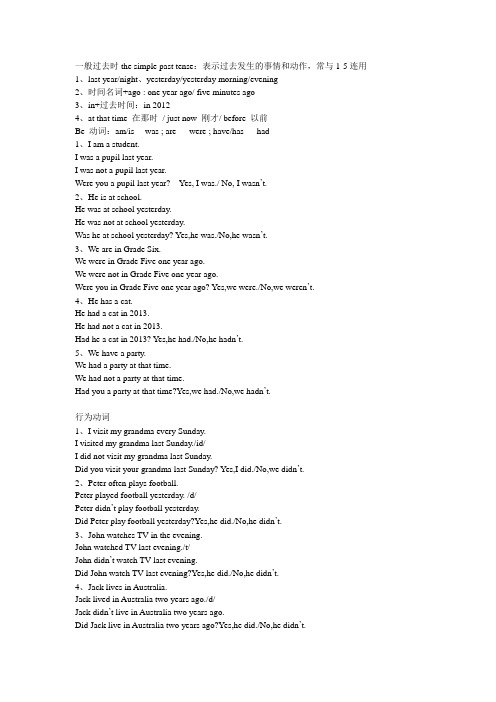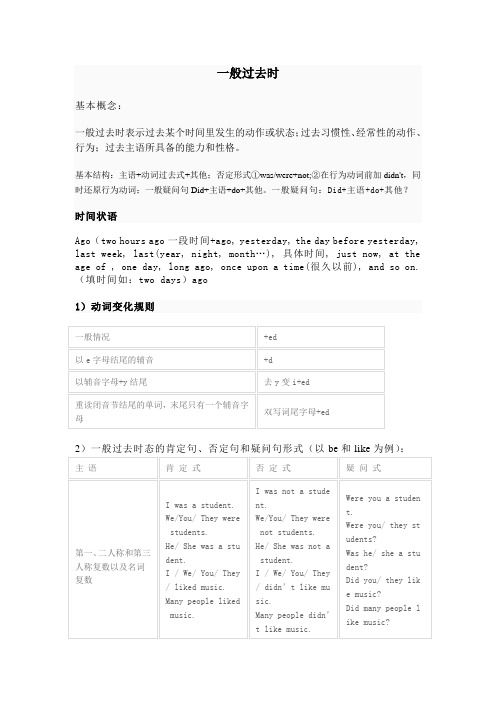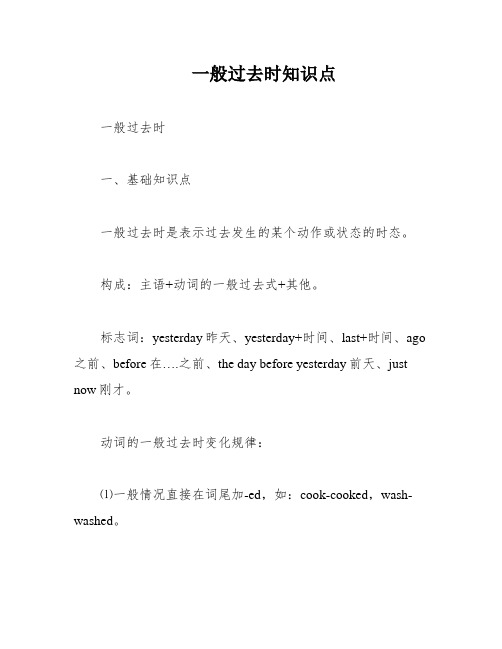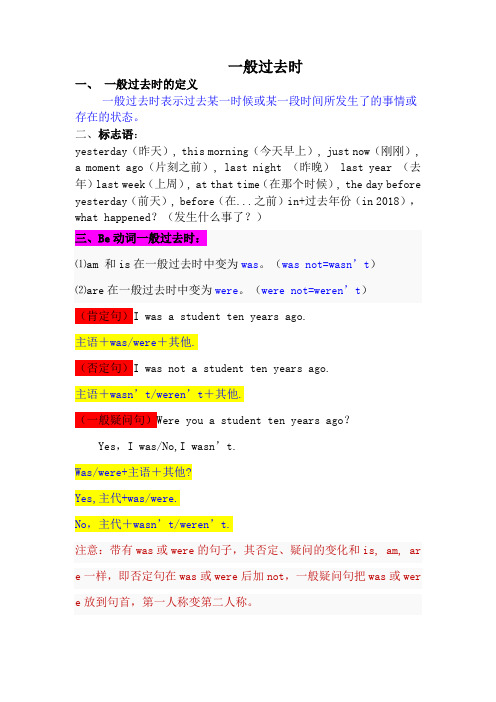一般过去时
一般过去时的概念及用法

一般过去时的概念及用法一、基本概念一般过去时(simple past tense)表示过去某个时间里发生的非持续性动作或存在的状态,也表示经常或反复发生的动作。
用动词的过去式表示,常和表示过去的时间状语连用,如:yesterday,last night,in 1990,two days ago,before,the age of等。
一般过去时也表示过去经常或反复发生的动作,常和often,always等表示频率的时间状语连用。
表示过去习惯性、经常性的动作、行为;过去所具备的能力和性格。
二、动词变化1.直接加ed: work—— worked look——looked2.以不发音e结尾的单词,直接加d: live ——lived hope——hoped use——used 3.以+y结尾的,变y为i加ed: study—— studied carry——carried worry——worried 4.以一个辅音字母结尾的,双写最后的+ed: stop—— stopped plan——planned重读闭音节体现形式为辅-元-辅结构,例如nod, n为辅音,o为元音,d为辅音。
5. 以ic结尾的动词,要把ic变成ick再加ed,如picnic→picnicked,traffic→trafficked 6.不规则变化的动词:have---had are---were get---got say---said feel---felt do/does---did is---was go---went drink--drank eat--ate bring----brought think----thought buy----bought catch---- caught teach ---- taught sit----sat wear----wore cut----cut sweep----swept sleep——slept see----saw bee----became read——read7.以辅元辅结尾的加d三、用法(1)一般过去时表示在某个特定时间发生,也可以表示过去习惯性、经常性的动作。
一般过去时

谓语动词的构成形式
一般过去时的谓语动词有be动词和行为动词两种 be动词的过去式为was和were两种。 行为动词的过去式,其变化分为规则和不规则的 变化。
规则动词过去式的构成:
1.一般动词原形末尾加-ed. 如look—>looked , stay—>stayed; 2.以不发音e结尾的动词只加-d。 如hope—>hoped , live—>lived; 3.末尾只有一个辅音字母结尾的重读闲音节的动词,应 先双写这音字母,在家-ed。 如:stop—>stopped , plan(计划)—>planned; 4.结尾是“辅音字母+y”的动词,现将y改为i,再加-ed 如:study—>studied , carry—>carried。
一般过去时态常见的基本用法
1.表示在过去时间里发生的动作或存在的状态。 Liu Jie got up at 7:10 this morning. He was a student three year ago.
2.表示过去经常或反复发生的动作。 Zhang Yaru always went to school by bike last term.
一般过去时
The simple past
一般过去时:
定义:动词的一般过去时态表示过去发生 的动作、情况或存在的状态。行为动词 (即定义动词)的过去式一般没有人称和 数的变化。 表示过去的时间状语:yesterday,two weeks ago,last Sunday,in 1998,just now the day before yesterday
考点-过去时间状语所决定的一般过去 时态:
一般过去时

三.一般过去时(simple past tense)1.概念一般过去时表示过去某一时刻,某一段时间发生的动作或存在的状态。
一般过去时用动词的过去式表示。
2.构成一般过去时用动词的过去式表示。
be的过去式有was,were两种; have 的过去式是had;规则动词的过去式在动词词尾加-ed,具体构成规则如下:1)一般情况,动词后加ed,例词work-worked,clean-cleaned,play-played,wash-washed2)以不发音的e结尾,-d,例词live-lived,move-moved,hope-hoped,arrive-arrived 3)以辅音字母+y结尾,变y为 i再加-ed,例词study-studied,carry-carried,cry-cried,identify-identified 4)以辅音字母结尾的重读闭音节,双写最后一个辅音字母加-ed,例词plan-plannedstop-stopped,beg-begged,grab-grabbed 3.用法 (1) 表示发生在过去的动作或存在的状态。
如:He went shopping with his friends last week.They arrived ten minutes ago.He became a hotel manager ten years ago.Did you go to the concert last night?(2) 表示在过去经常发生的动作或习惯动作。
如:He visited his grandparents once a month last year.She usually went to work by car last year.When I was at school, I always went to school by bus.4.如何识别一般过去时常见的标志词有:1). yesterday, the day before yesterday.2). last week / year / month / term …(简称last系列)3). two hours ago, three years ago, a moment ago…(简称ago系列)4). in / on + 过去的年/月/日,如 in 1999, on April, 20055). just now, once upon a time, one day…5.易错点例析:(1)——Your phone number again? I _________ quite catch it.——It’s 4331577A. didn’tB. couldn’tC. don’tD. can’t(2)——Mr. Smith isn’t coming tonight.——But he _________.A. promisesB. promisedC. will promiseD. had promised(3) ——Hey, look where you are going!——Oh, I’m terribly sorry. _________.A. I’m not noticingB. I wasn’t noticingC. I haven’t noticedD. I don’t notice(4) ——Oh it’s you ! I _________ you.——I’ve had my hai r cut.A. didn’t realizeB. haven’t realizedC. didn’t recognizeD. don’t recognized(5) ——Since you’ve agreed to go, why aren’t you getting ready?——But I _________ that you would have me start at once.A. don’t realizeB. didn’t realizeC. hadn’t realizedD. haven’t realized(6) ——It’s twelve o’clock, I think I must be off now.——Oh, really? I _________ it at all.A. don’t realizeB. haven’t realizedC. didn’t realizeD. hadn’t realizedKey:ABBCBC6.中考真题及模拟(2009朝阳区一模)He went into his room, _______ the light and began to work.A. has turned onB. will turn onC. turns onD. turned on(2009海淀一模)——What’s the best food have you had in Beijing, Alex?——Roast duck! I _________to a famous restaurant to have it last week.A. have goneB. goC. will goD. went(2009宣武区一模)——Do you know how many gold medals the 23-year-old Michael Phelps _____________at the 2008 Summer Olympic Games?——Eight.A. winB. winsC. wonD. has won(2008北京)We were in Qingdao last week and __________ great fun there.A. will haveB. have hadC. hadD. have(2007北京)——What did you do after school yesterday?——I _________basketball with my friends.A. playB. playedC. will playD. am playing(2005北京)---Hi, Kate. You look tired. What’s the matter?---I ______well last night.A. didn’t sleepB. don’t sleepC. haven’t sleptD. won’t sleep (2008四川泸州)Yesterday,Tony’s family _________ a good time.A. hasB. haveC. had(2007湖南湘潭)I’m sorry you’ve missed the train. It _______10 minutes ago.A. leftB. has leftC. had left(2007福州)——Mr Green, __________you________ Three Lanes and Alleys(三坊七巷)last Sunday?——No, but I’ll visit them next week.A. will; go toB. have; been toC. did; go toD. have; gone to (2007浙江)——What did the teacher say just now?——He __________us not to play computer games all day.A. tellsB. toldC. has toldD. is told(2007江西)——Inventors have changed the way we live.——So they are famous for the great things they _________.A. doB. didC. are doingD. had done(06江西)——Where’s the cake I made this morning?——We _______ it, mum. Can you make another one for us?A. ateB. eatC. will itD. were eating。
一般过去时

一般过去时the simple past tense:表示过去发生的事情和动作,常与1-5连用1、last year/night、yesterday/yesterday morning/evening2、时间名词+ago : one year ago/ five minutes ago3、in+过去时间:in 20124、at that time 在那时/ just now 刚才/ before 以前Be 动词:am/is ---was ; are --- were ; have/has --- had1、I am a student.I was a pupil last year.I was not a pupil last year.Were you a pupil last year? Yes, I was./ No, I wasn’t.2、He is at school.He was at school yesterday.He was not at school yesterday.Was he at school yesterday? Yes,he was./No,he wasn’t.3、We are in Grade Six.We were in Grade Five one year ago.We were not in Grade Five one year ago.Were you in Grade Five one year ago? Yes,we were./No,we weren’t.4、He has a cat.He had a cat in 2013.He had not a cat in 2013.Had he a cat in 2013? Yes,he had./No,he hadn’t.5、We have a party.We had a party at that time.We had not a party at that time.Had you a party at that time?Yes,we had./No,we hadn’t.行为动词1、I visit my grandma every Sunday.I visited my grandma last Sunday./id/I did not visit my grandma last Sunday.Did you visit your grandma last Sunday? Yes,I did./No,we didn’t.2、Peter often plays football.Peter played football yesterday. /d/Peter didn’t play football yesterday.Did Peter play football yesterday?Yes,he did./No,he didn’t.3、John watches TV in the evening.John watched TV last evening./t/John didn’t watch TV last evening.Did John watch TV last evening?Yes,he did./No,he didn’t.4、Jack lives in Australia.Jack lived in Australia two years ago./d/Jack didn’t live in Australia two years ago.Did Jack live in Australia two years ago?Yes,he did./No,he didn’t.5、She dances well.She danced well before./t/She didn’t dance well before.Did she dance well before?Yes,she did./No,she didn’t.6、A car stops here.A car stopped here just now./t/A car didn’t stop here just now.Did a car stop here just now?Yes,it did./No,it didn’t.7、They study hard.They studied hard at that time./id/They didn’t study hard at that time.Did they study hard at that time?Yes,they did./No,they didn’t.8、He goes to school on foot.He went to school on foot last year.He didn’t go to school on foot last year.Did he go to school on foot last year?Yes,he did./No,he didn’t.9、I do my homework every day.I did my homework five minutes ago./did/I didn’t do my homework five minutes ago.Did you do your homework five minutes ago?Yes,I did./No,I didn’t.行为动词过去式变化规则:1、大部分加ed:visit\play\ask\watch..2、以e结尾加d:live\dance\love3、以辅音字母加y:先把y变i 加ed:study\hurry\try4、以一个辅音字母结尾的重读闭音节应由一个元音和一个辅音字母结尾的动词,先双写该辅音字母,再加ed:jog\stop不规则动词:am is/are/have has/do/come/give/run/drink/begin/drink/give/sing/sit/eathear/makekeep/leaveknow/drawbring/buy/catch/cango/say/see/get/drive/take/meetlet/cut/put/read/cost读音:1、元音、浊辅音:/d/2、清辅音:/t/3、/t/、/d/:/id/结构:1、肯:主语+动词过去式+其它2、否:主语+didn’t+动原+其它3、一般疑问:Did+主语+动原+其它?4、特殊疑问:特殊疑问词+did+主语+动原+其它?特例:Who+动词过去式+其它?反义疑问:。
一般过去时时态

一般过去时基本概念:一般过去时表示过去某个时间里发生的动作或状态;过去习惯性、经常性的动作、行为;过去主语所具备的能力和性格。
基本结构:主语+动词过去式+其他;否定形式①was/were+not;②在行为动词前加didn't,同时还原行为动词;一般疑问句Did+主语+do+其他。
一般疑问句:Did+主语+do+其他?时间状语Ago(two hours ago一段时间+ago, yesterday, the day before yesterday, last week, last(year, n ight, month…), 具体时间, just now, at the age of , one day, long ago, once upon a time(很久以前), and so on.(填时间如:two days)ago1)动词变化规则2)一般过去时态的肯定句、否定句和疑问句形式(以be和like为例):3)一般过去时的用法:1.过去发生的动作。
例如:The police stopped me on my way home last night.2.过去存在的状态。
例如:They weren't able to come because they were so busy.3. 常用于一般过去时的时间状语:yesterday,three months ago,last year,in 1979,often,always 例题解析:举一反三,学的更轻松!1. r. Mott is out. But he ______ here a few minutes ago.A. wasB. isC. will beD. would be解析:时分钟前发生的动作,应该用一般过去时。
应选 A,2.---Hi, Tom.---Hello, Fancy. I ______ you were here.A.don't knowB.won't thinkC. thinkD. didn't know解析:虽然句中没有明确的时间状语,但是可以通过上下文语境判断出,我说这话之前不知道,但是现在知道了,表示过去的动作,要用过去时态。
一般过去时知识点

一般过去时知识点一般过去时一、基础知识点一般过去时是表示过去发生的某个动作或状态的时态。
构成:主语+动词的一般过去式+其他。
标志词:yesterday昨天、yesterday+时间、last+时间、ago 之前、before在….之前、the day before yesterday前天、just now刚才。
动词的一般过去时变化规律:⑴一般情况直接在词尾加-ed,如:cook-cooked,wash-washed。
⑵以不发音的e结尾的动词,在词尾+d,如:like-liked,live-lived。
⑶以重读闭音节结尾的动词,双写最后一个字母再在词尾+ed,如:ped,shop-shopped,plan-planned。
⑷以辅音字母+y结尾的动词,要改y为i再加ed,如:study-studied,carry-carried。
另外,还需记住不规则动词的一般过去时变形。
二、做题步骤:⑴先找到句子中表示一般过去时的标志词。
⑵确定句子的动词是用be动词还是行为动词。
Be动词的过去时练一、用be动词的适当形式填空1.I was at school just now.2.He was in Beijing on n last week.3.We were students two years ago.4.They were on the farm a moment ago. 5.Yang Ling was eleven years old last year. 6.There was an apple on the plate yesterday. 7.There was some milk in the fridge on Sunday.二、用行为动词的适当形式填空1.He lived in Wuxi two years ago.2.The cat ate a bird last night.3.We had a party last Halloween.4.Nancy picked up oranges on the farm last week。
一般过去时知识点

一般过去时一、一般过去时的定义一般过去时表示过去某一时候或某一段时间所发生了的事情或存在的状态。
二、标志语:yesterday(昨天), this morning(今天早上), just now(刚刚), a moment ago(片刻之前), last night (昨晚) last year (去年)last week(上周), at that time(在那个时候), the day before yesterday(前天), before(在...之前)in+过去年份(in 2018),what happened?(发生什么事了?)三、Be动词一般过去时:⑴am 和is在一般过去时中变为was。
(was not=wasn’t)⑵are在一般过去时中变为were。
(were not=weren’t)(肯定句)I was a student ten years ago.主语+was/were+其他.(否定句)I was not a student ten years ago.主语+wasn’t/weren’t+其他.(一般疑问句)Were you a student ten years ago?Yes,I was/No,I wasn’t.Was/were+主语+其他?Yes,主代+was/were.No,主代+wasn’t/weren’t.注意:带有was或were的句子,其否定、疑问的变化和is, am, ar e一样,即否定句在was或were后加not,一般疑问句把was或wer e放到句首,第一人称变第二人称。
(特殊疑问句)1.对I提问:Who was a student ten years ago?(Who作为主语时,谓语动词用三单)四、实义动词一般过去时:(肯定句)I walked to school yesterday.主语+动词过去式+其他.(否定句)I didn’t walk to school yesterday.主语+didn’t + 动词原形+其他.否定句变化规则:1、找be动词2、若无be动词,找情态动词(could)3、若无情态动词,请助动词(did)来帮助4、did放于主语的后面,动词的前面,加上not,did not= didn't5、动词变原形6、some->any and->or too->either(一般疑问句)Did you walk to school yesterday?Yes,I did. No,I didn’t.Did +主语+动词原形+其他?Yes,主代+did.No,主代+didn’t.一般疑问句变化规则:1、找be动词2、若无be动词,找情态动词(could)3、若无情态动词,请助动词(did)来帮助4、did放于开头,首字母大写5、第一人称变第二人称6、动词变原形7、some->any and->or too不变either(特殊疑问句)I went to school on foot yesterday.1.对I 提问:Who went to school on foot yesterday?2.对went to school 提问:What did you do on foot yesterday?3.对school 提问:Where did you go on foot yesterday?4.对on foot 提问:How did you go to school yesterday?5.对yesterday提问:When did you go to school on foot?动词变化规则:1、直接在动词后面加ed。
一般过去时

一般过去时(the past simple tense)用法:1.表示过去确定时间内发生的动作或状态,常与yesterday,last year, ago, once upon a time, just now, recently, during the day, for many years ect.2.表示过去连续发生的动作3.表示过去一段时间内经常或反复的动作,常与always ,never连用4.在since引导的从句中,主句用现在完成时,从句用一般过去时。
5.在时间,条件状语从句中,用一般过去时表示过去将来时结构:肯定:主+动词过去式+其他否定:主+wasn’t/weren’t +其他主+didn’t +动原+其他一般疑问句:was/were+主+动原+其他?Did +主+动原+其他?练习Ⅰ.用所给词的适当形式填空1.Jenny (not go to bed) until 11:00 o’clock last night.2.I (see) Li Lei (go) out just now.3.He (do) his homework every day. But he (not do)it yesterday.4.When I was young, I (play) games with my friends.5. She likes _________ newspapers, but she _________ a book yesterday. (read)6. _______ they ________ (sweep) the floor on Sunday? No, they _________.7.It ____ (be) the 2nd of November yesterday. Mr White ___ (go) to his office by car.8.I want to ______ apples. But my dad _______ all of them last month. (pick)9. Jim's mother _________ (plant) trees just now.10.He _______ football now, but they _______ basketball just now. (play)Ⅱ.改错1.How is Jane yesterday?2.What did he last week?3.Did you saw him just now?4.H e often goes home at 11:00 last month.5.Tom wasn’t watch TV last night.6.Tom suddenly is ill last night and have to stay at homefoeanother day.Ⅲ.改写句子1.I watched the night sky for about an hour. 改为否定句2.He waited for you three hours ago. 改为一般疑问句3.Was he a doctor two years ago? 做否定回答4.She went shopping with her friends. 对划线部分提问5.Karen had extra classes next week. 对划线部分提问。
- 1、下载文档前请自行甄别文档内容的完整性,平台不提供额外的编辑、内容补充、找答案等附加服务。
- 2、"仅部分预览"的文档,不可在线预览部分如存在完整性等问题,可反馈申请退款(可完整预览的文档不适用该条件!)。
- 3、如文档侵犯您的权益,请联系客服反馈,我们会尽快为您处理(人工客服工作时间:9:00-18:30)。
一般过去时
主要的教学技能: 讲解技能演示技能
选题介绍:
本微课就是六年级上册的语法知识:一般过去式。
一般过去式就是小学阶段英语学习中语法知识的一个重点,也就是难点之一。
为此设计本课引导、帮助学生对一般过去式的相关内容进行归纳、整
理。
学情分析:
六年级学生刚接触过去式,基础较薄弱,教师要引导、循序渐进地带领学生把知识进行梳理、整理,找出知识的构造规律,提高学习效率。
通过学习激发学生学习英语的兴趣与树立自信
心。
教学目标:
1、 Language knowledge语言知识:归纳动词过去式变化常见的五种形式。
Sentences句型:操练与巩固一般过去式的应
用。
2.语言技能目标:
能正确地说出动词的过去式,知道相应动词的过去式的构成规
律。
3、情感态度目标:
A、培养学生学会对已学知识进行观察,自行归纳与概括语言知识点的好习惯。
B、让学生从总结昨天做了什么,逐渐引导学生形成良好的生活习惯,学会珍惜时间。
教学重点与难点:
1、动词的一般过去式及其构成规律。
2、有关一般过去式的句型的运用。
前置性学习:复习有关一般过去式的相关知识:动词的过去式、过去式的句型。
创新点: 学生借助多媒体学习学习工具,将枯燥的语法知识进行自我疏通与整理。
教学过程:
教学总结:
本微课能有效地将信息技术与英语教学整合。
根据学生的学情,以培养学生的自我发展能力与创新能力为重点,关注学生差异。
教学过程中,采用循序渐进的教学原则。
并以PPT来展示整个教学环节,形象、直观、易懂,较好地落实了教学目标,解决重、难点。
学习效果较明显,达到了预期的理想效果。
一般过去时微课教学反思
本微课能有效地将信息技术与英语教学整合。
注重培养学生的自我发展能力与创新能力,关注学生差异。
让学生有更丰富的资源,更广阔的学习空间。
较好地落实了教学目标,解决重、难点。
感受最深的就是:多媒体信息技术使施教更直观,教学更流畅自然。
